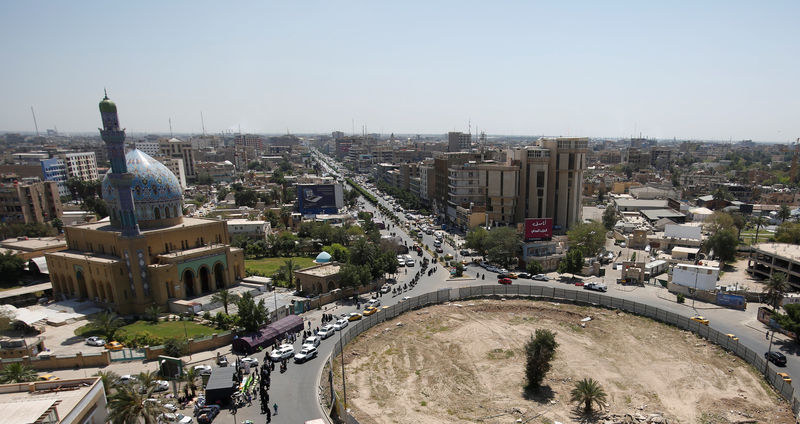By Raya Jalabi
BAGHDAD (Reuters) - From his 13th-floor balcony in central Baghdad, Salam Atta Sabri likes to reminisce about his city's storied past – the years before Saddam Hussein and the U.S.-led invasion which forever changed it.
On an overcast afternoon in spring, the 55-year-old artist pointed to stalwarts of Baghdad's historic center such as the 13th century palace of the Abbasid caliphs, and the city's ambling, literary heart around Mutanabbi Street.
Over coffee, he leafed through recent ink drawings of the city. "I remember walking those very streets when I was a boy… before everything changed."
Raised in Baghdad by a renowned artist father, Sabri left Iraq in the 1990s, when crippling economic sanctions made life unbearable, he said.
"Even when I lived in Los Angeles or Amman, my dream to return to Baghdad was always with me," he said. "In my dream, there would be a new reality on the ground, a new freedom… that's why I chose to return."
But when Sabri came back in 2005 - two years after the U.S.-led invasion which toppled Saddam and left a fractured country – Baghdad was a city under siege.
One of the ripple effects of the 2003 invasion was sectarian warfare, which irreparably changed Baghdad and its historically pluralistic society.
Kidnappings, killings and forced displacements of civilians by Sunni insurgents and Shi'ite militias were commonplace. Religious minorities were threatened enough to leave en masse, either for the north or overseas.
"But through it all she has always remained Baghdad mon amour, Baghdad my love," Sabri said.
CONCRETE SLABS
Sabri's reverence for Baghdad and its past as a center for art and learning, is echoed by many, both young and old – those who remember a pre-2003 Iraq and those who don't.
But the city is now a shell of what it once was. Security checkpoints obstruct once open streets and its famed hybrid architecture which married traditional brick homes with the modernist buildings by Le Corbusier and Rifat Chadirji, has been subsumed by concrete blast walls.
Power outages are commonplace and heavy-duty generators spew dark fumes, adding to some of the worst pollution in a smog-heavy region. Raw untreated sewage is still dumped into the Tigris and there are few accessible riverbanks and open spaces for children to play.
CAUTIOUSLY OPTIMISTIC
This decade-long decline in quality of life has given rise to nostalgia for pre-1980 Iraq – the year the country was plunged into its first of several wars.
But this is a dangerous airbrushing of Iraq's authoritarian past, said Hadi al Najjar, the president of the Society of Iraqi Photographers.
"Before 2003, we couldn't have an open conversation in a cafe in Baghdad without worrying about someone informing on us, or us informing on each other…. At least now, we no longer need to censor ourselves."
And while those like Sabri seek solace in memories, other Baghdad residents are looking forward with growing hope.
They say the situation in the capital has improved recently as the rate of security incidents has slowed and a strict curfew was lifted in 2015, allowing restaurants to flourish in well to-do districts like Mansour.
"Since 2003, we've just been trying to survive," said Mustafa Younes, a 27-year-old pharmacy worker, who said he’d lost two brothers during bombings in Baghdad in the last decade.

"But now, for the first time, we are starting to think about the future."